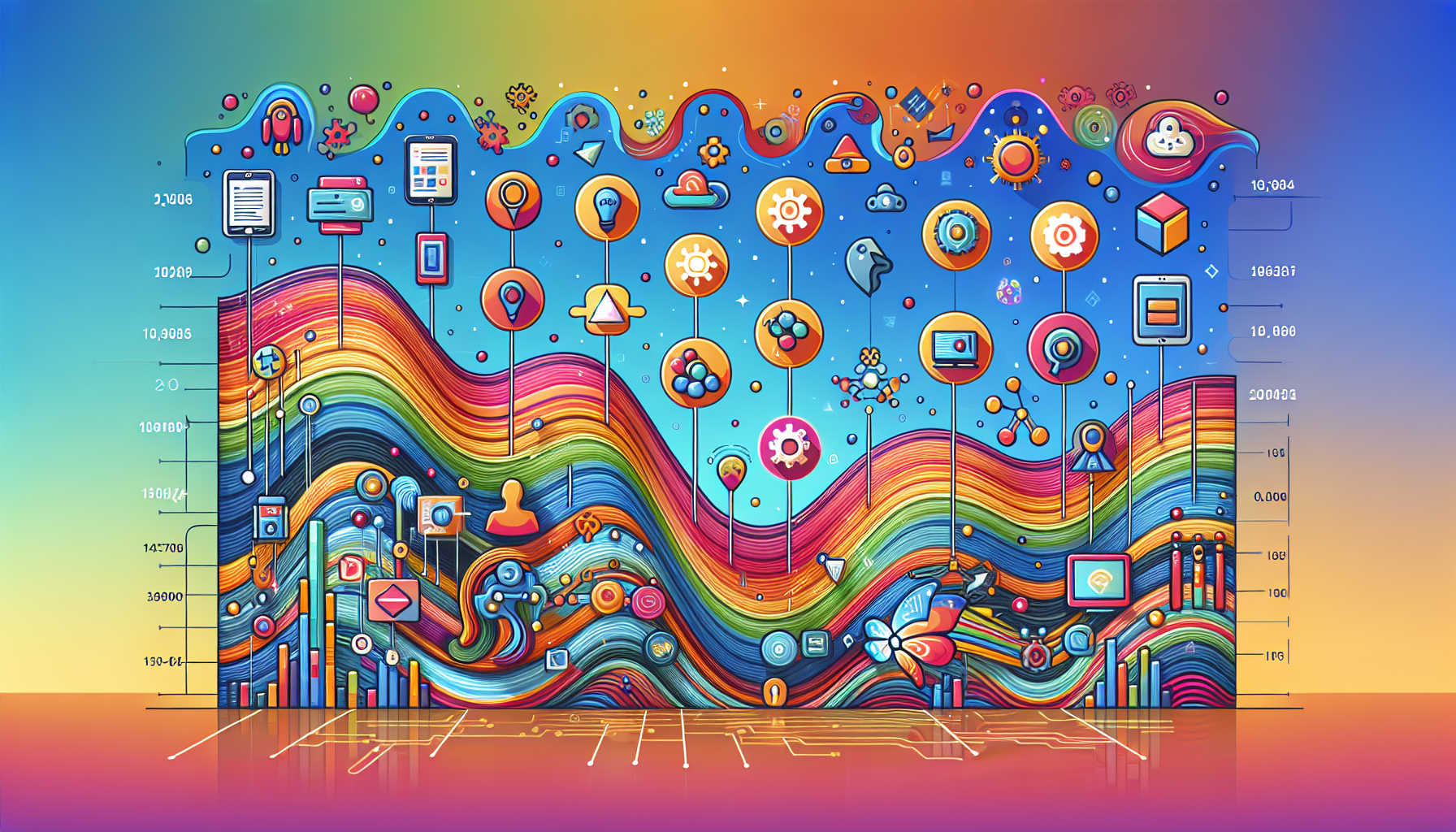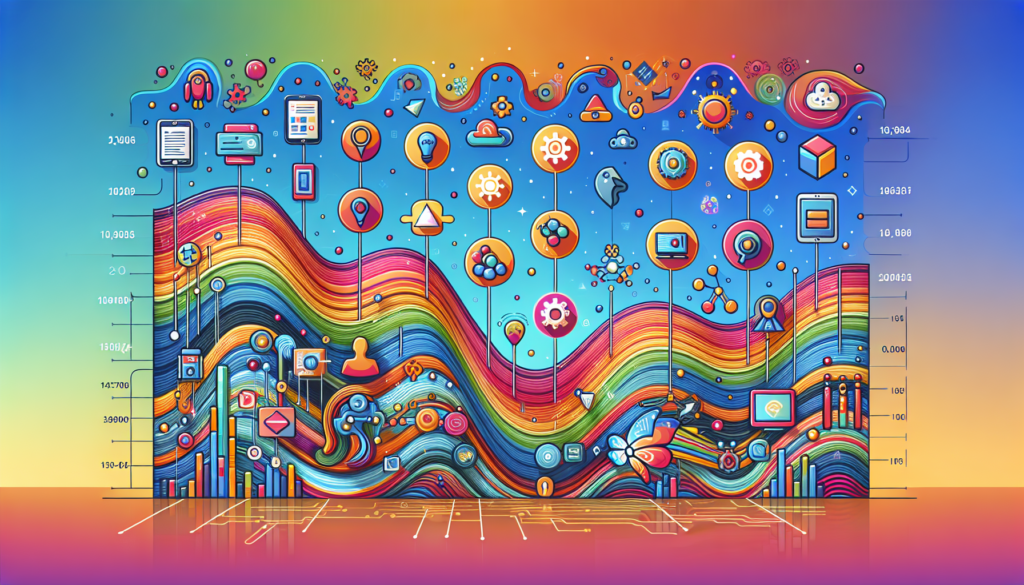AI is transforming software quality assurance by enhancing testing and debugging processes. This article explores how AI tools improve defect detection, automate test case generation, and enhance test coverage, all while incorporating AI and software quality assurance enhancing testing and debugging processes. Additionally, these tools enable self-healing scripts and facilitate proactive debugging. Discover the practical benefits of implementing AI-driven QA processes for creating reliable software products.
Key Takeaways
- The integration of AI in software testing enhances efficiency, accuracy, and speed, transforming traditional manual testing into robust automated processes.
- AI-driven tools improve test coverage by generating automated test cases and identifying complex scenarios, ensuring comprehensive assessment of software reliability.
- The adoption of AI technologies in QA necessitates new skills for professionals, including AI and machine learning competencies, to keep pace with the evolving testing landscape.
The Evolution of Software Testing with AI

The evolution of software testing has seen a significant transition from manual methods to AI-driven processes. This shift has dramatically enhanced the efficiency, accuracy, and speed of software testing, addressing the limitations of traditional methods. AI-powered tools provide advanced defect detection capabilities, uncovering bugs faster and more accurately than ever before. This transformation has improved the reliability and user experience of software products, making them more robust and user-friendly.
Continuous testing and automation are now vital components of modern software quality assurance. They enable rapid feedback and extended test coverage, ensuring that issues are identified and resolved early in the development process. The integration of AI in testing processes has made it possible to achieve a level of defect detection that was previously unimaginable, significantly enhancing the overall quality of software products.
As the software testing industry continues to evolve, AI testing tools are becoming indispensable. They allow for the automation of repetitive tasks, freeing up human testers to focus on more complex and creative aspects of testing. This not only speeds up the testing process but also improves the accuracy and reliability of the results.
The future of software testing is undoubtedly AI-driven, and those who embrace these technologies will be at the forefront of the industry.
Automated Test Case Generation
One of the most significant benefits of AI in software testing is automated test case generation. AI-driven tools analyze user interactions and generate optimal test cases, significantly reducing manual effort. This dynamic test case generation is made possible through AI techniques such as genetic algorithms, which adapt to changing software requirements. Automatically generating test cases with AI keeps testing aligned with code changes, boosting efficiency and accuracy.
Automation platforms enable the generation of test scripts directly from design mockups, allowing for early testing. This approach not only speeds up the testing process but also ensures that any issues are identified and resolved before the software is fully developed. By automating repetitive tasks and generating comprehensive tests, AI testing tools significantly expand test coverage, resulting in more reliable and robust software products.
AI test automation tools are transforming the way software testing is conducted. Utilizing machine learning algorithms, these tools generate relevant test cases covering a wide range of scenarios, thus ensuring thorough automated testing. This not only improves the quality assurance process but also reduces the time and effort required for manual testing. Additionally, ai software testing tools enhance the efficiency of the testing process.
The ability to automatically generate test cases is a game-changer for the software testing industry.
Enhancing Test Coverage with AI

AI significantly enhances test coverage by identifying more edge cases and complex scenarios that may go unnoticed during manual testing. This ability to uncover defects that traditional methods often miss ensures a higher level of software reliability and user satisfaction. AI identifies patterns and issues that may not be easily detectable by human testers, thereby enhancing the reliability of testing processes.
Machine learning algorithms play a crucial role in this process by automatically generating diverse test scenarios and data combinations. This improves coverage significantly, ensuring that all possible use cases are tested. AI tools like Mabl utilize machine learning to adapt tests to application changes, ensuring ongoing test coverage during the development lifecycle. This adaptability is essential in maintaining high standards of software quality in an ever-changing development environment.
Furthermore, integrative AI tools such as Perfecto expand test coverage by incorporating emulators and simulators early in the development lifecycle. This not only enhances the overall testing efficiency but also ensures that the software performs well across different environments and conditions. The advanced algorithms in AI tools enable intelligent automation of the testing process, leading to more robust and reliable software products.
Self-Healing Test Scripts
The concept of self-healing test scripts is one of the most exciting advancements in AI-driven software testing. Many AI testing solutions offer self-healing capabilities, adjusting to changes in user interfaces without manual intervention. These scripts leverage algorithms to recognize when UI elements have changed, allowing for continuous testing without interruptions. This minimizes the need for manual updates and ensures that the testing process remains efficient and accurate.
Self-healing test scripts use AI to automatically adjust to changes in the application’s user interface, significantly reducing the maintenance effort required for test scripts. These systems can autonomously identify and rectify failures during testing or operational phases, ensuring that the software remains robust and reliable. Machine learning capabilities in AI testing tools enhance their ability to adapt to changes in the application over time.
The integration of self-healing scripts leads to more stable testing processes, improving overall software quality. Reducing the need for manual intervention allows testers to concentrate on more complex and critical aspects of the testing process. This not only enhances the efficiency of the testing process but also improves the accuracy and reliability of the results.
Self-healing test scripts are a testament to the power of AI in revolutionizing software testing.
Predictive Analytics for Proactive Debugging
Predictive analytics is another powerful tool in the AI-driven QA arsenal. AI testing tools can predict potential issues, helping QA teams concentrate on areas likely to fail, thus improving software reliability. Analyzing historical data and test results enables AI to predict potential failure areas, facilitating proactive testing and debugging. This proactive approach ensures that issues are identified and resolved before they impact the end-user.
AI’s ability to predict defects relies on analyzing project data and identifying trends that help predict future software failures. This not only enhances the efficiency of the testing process but also improves the overall quality of the software. Predictive and path analysis help identify potential issues before they affect users, ensuring a seamless user experience. Implementing predictive analytics within QA can help organizations proactively address potential issues before they impact software performance.
By using predictive analytics, QA teams can identify high-risk areas in applications by assessing code complexity and change frequency. This allows for a more targeted and efficient testing process, ensuring that critical areas are thoroughly tested. The integration of predictive analytics in QA helps in proactive resolution of issues, enhancing user satisfaction and software reliability.
Visual Testing and Computer Vision

Visual testing and computer vision are revolutionizing the way software testing is conducted. AI employs machine learning techniques to assess visual elements of applications, enhancing testing accuracy significantly. Visual testing automation improves design and visual approval by automating tasks typically requiring human interpretation. This ensures that the visual aspects of the application are thoroughly tested, leading to a more polished and user-friendly product.
Machine learning-based visualization tools can identify differences in images that are difficult for humans to detect, ensuring comprehensive coverage. AI evaluates web page layouts by understanding data and design rules, allowing for testing without human intervention. Cross-browser testing enables applications to be validated across various browsers to ensure consistent user experiences. AI-driven visual testing tools compare visual elements and layouts, enhancing user interface consistency across platforms.
Tools like Applitools specialize in visual testing across multiple devices and screen sizes, ensuring a uniform interface for users. Sauce Labs supports mobile and load testing, which contributes to a seamless user experience across various conditions. Functionize ensures pixel-perfect experiences through visual verifications using computer vision and AI technologies. Visual testing conducted by Sauce Labs verifies that applications meet design specifications, enhancing overall quality assurance.
Continuous Testing in CI/CD Pipelines
Continuous testing is a critical component of modern software development, and AI-powered testing tools facilitate this process within CI/CD pipelines. These tools enable automated tests with every code change, providing immediate feedback and catching errors earlier in development. This rapid feedback loop is essential for maintaining high-quality software in a fast-paced development environment.
AI tools contribute to CI/CD pipelines by automating tasks like code integration, testing, and deployment. This not only speeds up the development process but also ensures that any issues are identified and resolved quickly. Predictive analytics assists in optimizing test coverage by suggesting relevant test cases based on recent changes. This ensures that critical areas are thoroughly tested, reducing the risk of defects in the final product.
By integrating AI-powered testing tools into CI/CD pipelines, organizations can achieve a continuous testing approach that enhances the overall quality and reliability of their software products. This approach not only improves the efficiency of the testing process but also ensures that any issues are identified and resolved promptly, leading to a more robust and user-friendly product.
Machine Learning Algorithms in QA
Machine learning algorithms are at the heart of AI-driven Quality Assurance (QA) processes. These algorithms enhance QA by analyzing historical data to improve test strategies and execution. By understanding user interactions, machine learning algorithms can automatically create relevant test cases, ensuring thorough testing of the software. This not only improves the efficiency of the testing process but also enhances the overall quality of the software.
AI testing tools combine artificial intelligence and machine learning to improve QA effectiveness and efficiency. By leveraging these advanced technologies, QA teams can identify and address issues more quickly and accurately, leading to more reliable and robust software products.
The integration of machine learning algorithms in QA is transforming the way software testing is conducted, making it more efficient and effective.
Functional and Regression Testing with AI

Functional and regression testing are critical components of the software testing process, and AI is streamlining these tasks by automating tedious and repetitive tasks. AI-driven tools are very effective in quickly identifying bugs. Their accuracy significantly enhances overall quality assurance. By automating these tasks, AI not only enhances the efficiency of the testing process but also ensures that the software remains reliable and robust.
AI not only executes tests but also adapts test flows based on insights gained from previous cycles. This adaptive approach ensures that the testing process is continuously optimized, leading to more accurate and reliable results. Enhanced efficiency and accuracy in testing processes lead to a more reliable software product.
The integration of AI in functional and regression testing is transforming the way these tasks are conducted. By leveraging AI-powered testing tools, organizations can achieve a higher level of test coverage and accuracy, ensuring that their software products are of the highest quality. This not only improves the overall quality assurance process but also reduces the time and effort required for manual testing.
Improving Test Accuracy with AI Tools
Improving test accuracy is one of the most significant benefits of using AI tools in software testing. AI enhances the accuracy of quality assurance by identifying defects that may be missed by human inspectors. AI can detect anomalies in test results, quickly identifying potential issues that need attention. This ensures that any issues are identified and resolved promptly, leading to more reliable and robust software products.
AI tools can help identify patterns and anomalies during testing that human testers might miss, enhancing the overall QA process. AI-driven testing minimizes the risk of human error, leading to more reliable testing outcomes. By leveraging machine learning algorithms, AI can perform extensive testing much faster than human testers, leading to better efficiency in covering complex applications.
Utilizing AI in testing significantly reduces human error, enhancing the reliability of test results. AI improves consistency in testing by leveraging machine learning to identify patterns and anomalies. This not only enhances the efficiency of the testing process but also ensures that the software products are of the highest quality. AI-powered tools contribute to test accuracy by enhancing normal testing efforts and providing the best test coverage.
Resource Optimization in QA
AI optimizes resource allocation in quality assurance. It intelligently distributes testing tasks according to priority, complexity, and required expertise. AI can predict necessary resources for future testing phases, enabling more effective resource planning. This ensures that critical areas are thoroughly tested, reducing the risk of defects in the final product.
Automation in CI/CD minimizes downtime and accelerates code releases, leading to more efficient resource utilization. AI tools help identify bottlenecks in CI/CD pipelines, enhancing troubleshooting efficiency.
AI monitoring tools provide organizations with real-time performance insights, enabling quick issue resolution. This not only improves the efficiency of the testing process but also ensures that resources are used effectively.
Real-World Applications of AI in QA

Artificial Intelligence in Quality Assurance uses machine learning and other AI technologies. These tools help automate and improve software testing. AI-powered testing tools have a significant impact on software quality, improving efficiency and accuracy throughout the testing processes.
For example, Functionize is an AI-powered test automation platform that is particularly suitable for web-based applications. This platform leverages AI to generate and execute tests, ensuring comprehensive testing coverage and reliable results.
Perfecto offers robust API testing by monitoring API behavior from early development stages to production. This ensures that any issues are identified and resolved promptly, leading to more reliable and robust software products. Additionally, Perfecto provides UX load testing for web and mobile applications, allowing real-world condition simulations to validate performance. This capability ensures that the software performs well under various conditions, enhancing user satisfaction.
The AI-driven performance testing capability allows simulation of numerous virtual users to assess system performance under various conditions. Real-time data analytics provided by AI enables companies to make swift, informed decisions related to quality control.
These real-world applications of AI in QA demonstrate the transformative impact of AI on software testing, making it more efficient, accurate, and reliable.
Ethical Considerations in AI-Driven QA
The ethical application of AI in QA must align with principles that promote fairness, accountability, and transparency. The principles of beneficence and nonmaleficence guide the ethical use of AI, ensuring it contributes positively to outcomes. AI systems should incorporate mechanisms that allow for the identification and mitigation of biases. This ensures that the results produced by AI are fair and unbiased, leading to more reliable and trustworthy software products.
Involving humans in decision-making can enhance the ethical integrity of AI processes. Stakeholder engagement is essential for ensuring AI applications are ethically sound and aligned with community values. By fostering a culture of ethical AI use, organizations can ensure that their AI-driven QA processes are not only effective but also fair and transparent. This not only enhances the reliability of the testing process but also builds trust among users and stakeholders.
Challenges and Solutions in Implementing AI in QA
Organizations face various challenges when implementing AI in quality assurance, including integration difficulties, transparency issues, and bias in decision-making. Establishing trust in AI systems is crucial, as users may hesitate to rely on AI-driven decisions due to perceived lack of reliability. Implementing AI in QA can require significant changes to existing workflows, which can meet resistance from the team. Regulatory compliance can also pose challenges, as organizations must ensure that AI systems adhere to industry standards and regulations.
One solution to these challenges is to involve humans in the decision-making process, ensuring that AI outputs are validated and reliable. Organizations can also invest in training and upskilling their QA teams to better understand and leverage AI tools. This not only enhances the efficiency of the testing process but also builds trust in AI-driven QA. Addressing these challenges enables organizations to integrate AI into their QA processes successfully, resulting in more reliable and robust software products.
Another solution is to ensure that AI tools are compatible with legacy systems, minimizing potential disruptions. Enhancing productivity with AI tools and understanding their limitations help testers ensure effective and reliable AI-driven QA processes. By addressing these challenges, organizations can successfully implement AI in their QA processes, leading to more efficient and reliable software testing.
Preparing for the Future: Developing an AI-Driven QA Strategy
Organizations should focus on creating a QA strategy that integrates AI to improve testing efficiency and accuracy. This involves investing in AI-powered testing tools, training QA teams to leverage these tools effectively, and continuously monitoring and optimizing the testing process. Developing a comprehensive AI-driven QA strategy helps organizations ensure their software products are of the highest quality and meet user expectations.
A successful AI-driven QA strategy should also involve continuous improvement and adaptation. This means regularly updating AI tools and algorithms to keep pace with evolving software development practices and integrating feedback from users and stakeholders. By staying ahead of the curve, organizations can ensure that their AI-driven QA processes remain effective and reliable in the long term.
The Impact of AI on QA Jobs and Skills
The integration of AI in QA is transforming the skills required for QA professionals. Skills in AI and machine learning have seen a significant increase in demand among QA professionals. New skills, including neuro-linguistic programming, business intelligence, and algorithmic analysis, are becoming essential for QA testers working with AI. Career advancement in QA will increasingly depend on adaptability and willingness to learn new AI-related skills.
Soft skills such as communication and critical thinking are also becoming increasingly valuable in the evolving QA landscape. As organizations integrate AI, testers face challenges in ensuring fairness, bias, and reliability in AI outputs.
As AI tools are adopted, the role of manual testers will increasingly shift. They will focus more on exploratory testing, user experience optimization, and test strategy development. This shift will require QA professionals to develop new skills and adapt to new workflows.
Organizations will need to prioritize candidates with AI and machine learning skills as these competencies become critical. Fostering a culture that embraces AI in QA requires upskilling teams to better understand and leverage advanced testing tools. Investing in training and upskilling existing QA teams allows organizations to address the skills shortage in AI-powered testing, ensuring their QA processes remain effective and reliable.
Summary
The integration of AI in software testing has revolutionized the way QA processes are conducted. From automated test case generation and enhancing test coverage to self-healing test scripts and predictive analytics for proactive debugging, AI has significantly improved the efficiency, accuracy, and reliability of software testing. Visual testing and computer vision, continuous testing in CI/CD pipelines, and machine learning algorithms have further enhanced the quality assurance process.
As we look to the future, developing an AI-driven QA strategy and addressing the challenges of implementing AI in QA will be crucial for organizations. The impact of AI on QA jobs and skills highlights the need for continuous learning and adaptation in the evolving QA landscape. By embracing AI and leveraging its capabilities, organizations can ensure that their software products are of the highest quality, meeting user expectations and driving success.
Frequently Asked Questions
How does AI improve the efficiency of software testing?
AI enhances software testing efficiency by automating repetitive tasks, dynamically generating test cases, and delivering rapid feedback through continuous testing processes. This leads to faster identification of defects and improved overall quality of software.
What are self-healing test scripts, and how do they work?
Self-healing test scripts utilize artificial intelligence to automatically adapt to changes in an application’s user interface, thereby reducing the necessity for manual updates and maintaining uninterrupted testing. This approach ensures greater efficiency and reliability in the testing process.
How does predictive analytics enhance QA processes?
Predictive analytics enhances QA processes by utilizing historical data and test results to pinpoint potential failure areas, enabling proactive testing and debugging. This approach leads to improved quality assurance outcomes and increased efficiency.
What are some real-world applications of AI in QA?
AI is effectively utilized in QA through tools such as Functionize for web applications, Perfecto for API and UX load testing, and Applitools and Sauce Labs for visual testing. These applications enhance the efficiency and accuracy of quality assurance processes.
What skills are becoming essential for QA professionals in the AI-driven landscape?
In the AI-driven landscape, QA professionals must prioritize skills in AI and machine learning, along with strong communication and critical thinking abilities. These competencies are vital for adapting to the evolving demands of quality assurance in technology.
About InTech Ideas
If you’re looking to elevate your tech strategy and drive business growth, InTech Ideas is here to help. We offer a comprehensive suite of services, including Software Development Teams, Product Development Fast Track, and Product Leadership & Advisory. Whether you need to scale your development team, fast-track your product, or bring in expert leadership, we provide tailored, people-first solutions that align with your company’s goals. Learn more about how we can support your journey by exploring our services or contacting us today to discuss your specific needs.

